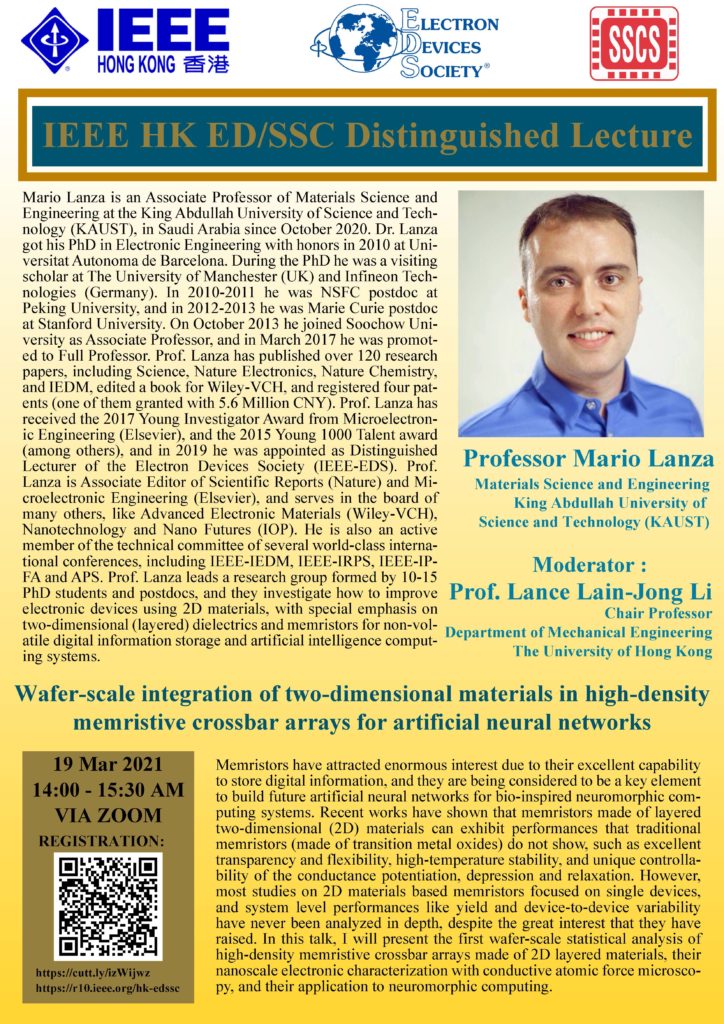Wafer-scale integration of two-dimensional materials in high-density memristive crossbar arrays for artificial neural networks
Prof. Mario Lanza
Materials Science and Engineering at the King Abdullah University of Science and Technology (KAUST), Saudi Arabia, [email protected]
Abstract
Memristors have attracted enormous interest due to their excellent capability to store digital information, and they are being considered to be a key element to build future artificial neural networks for bio-inspired neuromorphic computing systems. Recent works have shown that memristors made of layered two-dimensional (2D) materials can exhibit performances that traditional memristors (made of transition metal oxides) do not show, such as excellent transparency and flexibility, high-temperature stability, and unique controllability of the conductance potentiation, depression and relaxation. However, most studies on 2D materials based memristors focused on single devices, and system level performances like yield and device-to-device variability have never been analyzed in depth, despite the great interest that they have raised. In this talk, I will present the first wafer-scale statistical analysis of high-density memristive crossbar arrays made of 2D layered materials, their nanoscale electronic characterization with conductive atomic force microscopy, and their application to neuromorphic computing.
Bio
Mario Lanza is an Associate Professor of Materials Science and Engineering at the King Abdullah University of Science and Technology (KAUST), in Saudi Arabia since October 2020. Dr. Lanza got his PhD in Electronic Engineering with honors in 2010 at Universitat Autonoma de Barcelona. During the PhD he was a visiting scholar at The University of Manchester (UK) and Infineon Technologies (Germany). In 2010-2011 he was NSFC postdoc at Peking University, and in 2012-2013 he was Marie Curie postdoc at Stanford University. On October 2013 he joined Soochow University as Associate Professor, and in March 2017 he was promoted to Full Professor. Prof. Lanza has published over 120 research papers, including Science, Nature Electronics, Nature Chemistry, and IEDM, edited a book for Wiley-VCH, and registered four patents (one of them granted with 5.6 Million CNY). Prof. Lanza has received the 2017 Young Investigator Award from Microelectronic Engineering (Elsevier), and the 2015 Young 1000 Talent award (among others), and in 2019 he was appointed as Distinguished Lecturer of the Electron Devices Society (IEEE-EDS). Prof. Lanza is Associate Editor of Scientific Reports (Nature) and Microelectronic Engineering (Elsevier), and serves in the board of many others, like Advanced Electronic Materials (Wiley-VCH), Nanotechnology and Nano Futures (IOP). He is also an active member of the technical committee of several world-class international conferences, including IEEE-IEDM, IEEE-IRPS, IEEE-IPFA and APS. Prof. Lanza leads a research group formed by 10-15 PhD students and postdocs, and they investigate how to improve electronic devices using 2D materials, with special emphasis on two-dimensional (layered) dielectrics and memristors for non-volatile digital information storage and artificial intelligence computing systems.
Registration link: https://hkust.zoom.us/meeting/register/tJ0of-mvqz0oGdzo-FBeYW1C73awTZ0OHTeb

